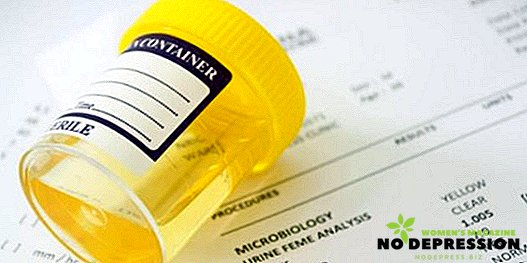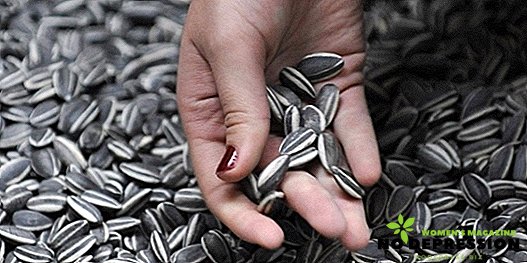There should be no protein in the urine of a healthy person. It can increase only in some cases. For example, after heavy physical exertion, nervous overstrain, or a long stay in the cold.
In addition, allergic reactions and infectious diseases can provoke a high protein concentration. Small deviations from the norm can be found in a newborn child, but this is more often not signs of any disease.

Traces of protein in the urine - what is it? The disease, in which in the urine protein is found in large quantities, is called proteinuria. Protein molecules are large, so their release through the hepatic tubules is difficult. If the test results showed their presence in the urine, we can safely talk about kidney disease.
Highly qualified specialists very often diagnose false proteinuria. This is due to blood entering the urine during the menstrual cycle during improper collection of tests.
Urine protein in women and men
During the day, the kidneys of a healthy person pass through themselves from 50 to 100 g of protein bodies. If the organs work without interruption, the protein should not be in the urine or in very small concentrations. The daily rate of protein in urine in women and men is no different:
- the normal protein concentration in a typical urine test is from 0 to 0.033 g / l;
- when taking the daily analysis, the protein in urine should be at least 150 g in twenty-four hours.
With the help of a general urine test, the protein concentration found in the daily portion of urine is detected.
For a healthy man, a level of up to 0.01 g / l is considered the norm, while for women, 0.03 g / l is allowed.
Elevated protein in the urine: causes
The concentration of proteins in the urine may be associated with physiological and pathological changes in the body. For example, the level may be high due to the large amount of protein food consumed: most often diagnosed in athletes.
There are also a number of factors that provoke the appearance of proteins, but which are a threat to health:
- long stay outside in hot weather;
- being upright for several hours;
- palpation of the abdomen in the kidney area;
- stressful situations;
- epileptic seizures;
- brain concussion.
The above reasons provoke an increase in proteins to 0.3 g during the day. But with their elimination, their concentration returns to normal.

If the urine was detected protein above normal, then this is the first sign to think about your health: this can be an indication of a serious disease:
- Disrupted urinary system;
- The defeat of the glomerular apparatus of the kidneys and the renal parenchyma - nephropathy;
- The inflammatory process in the kidneys, which affects the tubular system of the organ, the parenchyma and the renal pelvis - pyelonephritis;
- Sand and stones in the renal structures and urinary tract;
- Inflammation of the bladder affecting the mucous membrane - cystitis;
- Inflammatory disease of the prostate gland - the prostate;
- Inflammation of the urethra - urethritis.
Also, proteinuria can be triggered by congestion in the kidneys, tubular necrosis, renal amyloidosis, genetic tublopathy. Elevated levels of protein are observed in tuberculosis, leukemia, hemolysis, myopathy and a malignant tumor of the kidneys.

Before taking the analysis, the doctor is always advised to exclude in a few days the intake of certain foods that increase the protein in the urine. These include:
- salty food;
- sweet;
- spicy dishes;
- vinegar;
- alcoholic beverages;
- water with gases.
Deviations from the norm can be observed when drinking liquid in minimal quantities, long-term intake of vitamins. Irritation of the parenchyma of the kidneys can cause dogrose infusions, provoking an increased concentration of protein in the urine.
Symptoms of deviation from the norm
Proteinuria is one of the symptoms of diseases of the urinary system. If the amount of protein in the urine is slightly overestimated, then symptoms may be excluded, especially if the reasons are of a physiological nature.
But if proteinuria was triggered by inflammatory diseases, the following symptoms may occur:
- frequent dizziness;
- increased body temperature;
- constant feeling of tiredness, drowsiness;
- decreased appetite;
- nausea, vomiting;
- increased blood concentration in the urine;
- pain when urinating (cystitis);
- high blood pressure (nephropathy).
Visual symptoms may also indicate increased protein in the urine. For example, if foaming and ammonia smell appear when shaking, you can accurately diagnose proteinuria.
P
In this case, the urine appears turbid in appearance, slightly brown, after a few minutes a precipitate can be seen.
A lot of protein in the urine - how does it threaten, what is the danger?
Proteinuria is accompanied by the loss of various proteins, so the effects can be different. For example, a decrease in oncotic pressure associated with loss of albumin causes severe swelling of the extremities, disorders of the nervous system, and an increase in the concentration of lipids.
 Elevated levels of proteins in the urine can trigger low body resistance to infectious agents. Deviations from the norm cause poor blood clotting, so the patient can very often suffer from bleeding from the nose, which can sometimes be dangerous to a person’s life.
Elevated levels of proteins in the urine can trigger low body resistance to infectious agents. Deviations from the norm cause poor blood clotting, so the patient can very often suffer from bleeding from the nose, which can sometimes be dangerous to a person’s life.
Protein in the body play an important role - building, protective, structural, hormonal. Therefore, their loss can have a negative impact on most organs (heart, liver), nervous or mental systems can be disturbed.
What does protein mean during pregnancy?
Very often, during pregnancy, the kidneys of women can not cope with the loads, so protein appears in the urine.
Protein concentration in daily urine of up to 300 mg is considered normal for pregnant women, therefore, in the absence of serious symptoms, there can be no cause for concern.
In the last months of pregnancy, the concentration of proteins can reach 500 mg, while there is no danger to the life of the mother and baby.
What does protein in the urine of a child mean?
A healthy child in the urine should not have proteins, sometimes a small concentration can be detected, which directly depends on the age of the baby and its weight.
Detection of protein in the loins above normal may indicate excessive consumption of breast milk when kidney function is reduced. In addition, the causes of proteinuria in a baby can be:
- allergy;
- stressful situations;
- use of water in minimal quantities;

- Body temperature;
- minor or severe burns;
- long-term drug treatment;
Diseases of the kidneys and urinary tract are very common in newborns, this can be caused by heredity, fetal malformation, intrauterine infection, lack of oxygen during labor, infection with infection or fungi.
Any changes in the behavior of the baby, changes in the color of the urine should alert the parents. In this case, the trip to the pediatrician for a thorough examination should not be postponed.
Diagnosis and treatment with increased urine protein content
Diagnostic measures for proteinuria begin with a urinalysis. Depending on the situation, the attending physician may prescribe the collection of urine per day. Even with minor deviations from the norm, the patient is prescribed an additional ultrasound of the kidneys, a blood test for hormones and sugar.
 Treatment of proteinuria begins with the identification of the cause and its elimination. A small concentration of protein often does not require medication. In this case, the doctor advises to follow a special diet that excludes salty, spicy and protein foods.
Treatment of proteinuria begins with the identification of the cause and its elimination. A small concentration of protein often does not require medication. In this case, the doctor advises to follow a special diet that excludes salty, spicy and protein foods.
If the causes of the disease are serious diseases, then appropriate therapy is prescribed. For example, inflammatory processes are treated with non-steroidal anti-inflammatory drugs or hormonal.
Diseases such as malignant tumors and diabetes mellitus, causing a high concentration of proteins, require periodic consultation with specialists and taking appropriate medications.
Are there effective remedies for proteinuria?
Traditional medicine offers a large number of recipes that can cope with the problem. But do not forget that self-medication can only aggravate the situation, therefore, consultation with specialists should be held beforehand.
Traditional healers, for example, offer to take parsley infusions. For this, a tablespoon of the seeds of a plant is poured with boiling water of hot water and infused for a couple of hours. After filtering the infusion is taken throughout the day.
 You can also use parsley root: it is crushed and one tablespoon is poured with boiling water. Root insist a few hours and take four times a day for a tablespoon.
You can also use parsley root: it is crushed and one tablespoon is poured with boiling water. Root insist a few hours and take four times a day for a tablespoon.
Cranberry has a positive effect on the reduction of protein in the urine. Berries need to crush and pour cold water. Drink Morse as often as possible. After a few days, the concentration of proteins will decrease, and the immune system is activated.
Preventive measures
Prevention of proteinuria is in proper nutrition, the daily rate of water, with the exception of alcoholic and carbonated drinks, nicotine. It is very important to monitor the weight, the excess of which entails not only serious health problems, but also proteinuria.
If the pathology is caused by more serious diseases, then you should regularly visit specialists and take medications.
The effects of proteinuria can be different, so early diagnosis and timely action can lead to a positive result.
A few more tips on what to do if a child has protein found in the urine is in the next video.













